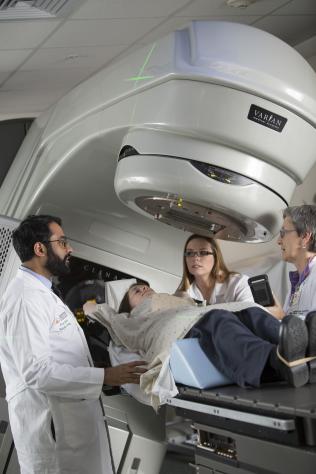Included below are some of the questions most frequently asked by our patients:
What is radiation therapy?
Radiation therapy, also called radiotherapy, is one of the most common treatments for cancer, used in more than half of all cancer cases. In radiation therapy, we use high-energy rays to destroy cancer cells in your body. We deliver radiation in 2 ways:
- External radiation therapy, using a special machine called a linear accelerator
- Internal radiation therapy, by implanting or injecting radioactive substances at or near the treatment area
Our team uses the most advanced computer planning and treatment delivery systems to precisely deliver the radiation. Your safety is of paramount importance to us.
What is a radiation oncologist?
Our radiation oncologists specialize in using radiation to treat cancer and some benign diseases. During your consultation, your radiation oncologist discusses treatment options and advises on the best treatment for you. We work with other cancer specialists and health care professionals involved in your care. We meet with you on a regular basis to check on the status of your treatment.
What can I expect?
As a new patient, your first visit is a consultation visit. This is followed by a planning—or "simulation"—visit. After your consultation and planning visits, we schedule your radiation treatments according to your prescribed treatment plan.
When are treatments usually given?
Treatments are usually given each day of the week, Monday thorugh Friday. In most cases, you will be treated at the same time every day. Occasionally, scheduling conflicts arise and your appointment time may have to be changed or delayed.
Your radiation oncologist will meet with you weekly while you are on treatment. This will be done immediately after your radiation treatment. The nurse is available daily for any concerns you may have. During the course of radiation therapy, it is important that you eat a well-balanced diet and plan for adequate rest. In many cases, your level of daily activity does not have to be restricted. However, you should ask your physician or nurse about any restrictions that might apply to you.
Will I experience side effects?
Radiation therapy can cause damage to healthy cells, though we do everything we can to minimize this. Damage to your healthy cells may cause side effects. Your radiation oncologist or nurse will talk with you about side effects you might experience and recommendations for helping to cope with them.
Does radiation treatment hurt?
No. You won’t feel, hear, see, smell, or taste the radiation beams as they pass through your body.
Will I be radioactive after my treatment?
Radiation is produced by our machines only during treatment. Your treatments will not cause you to become radioactive. You can be around family and friends after external radiation therapy. If you are receiving internal radiation therapy such as brachytherapy, which requires placing radioactive implants in or around the treatment area, your radiation oncologist will review any special instructions with you.
What is a portal film?
During radiation therapy treatments, the therapist will be taking verification X-rays (also called portal films) once a week. These films are necessary to check treatment alignment. The films verify that the markings that have been placed on you or on your immobilization device used during your treatment have not shifted from their original placement. It is critical that we reproduce your treatment positions each time you have treatment so we can achieve the best results. The films do not give us information about tumor response during radiation therapy.
What if I have questions during my treatment session?
We monitor you closely during your treatments. Though your therapist will not be in the room when radiation begins, we can see you and you can talk with us at any time during your treatment using the intercom in the treatment room.
No two people are exactly alike
It is important to remember that no two centers or treatment plans are exactly alike either. The experience of other patients may not apply to you. Your doctor and nurse know you as an individual. They can provide you with the best answers to your questions or concerns.
